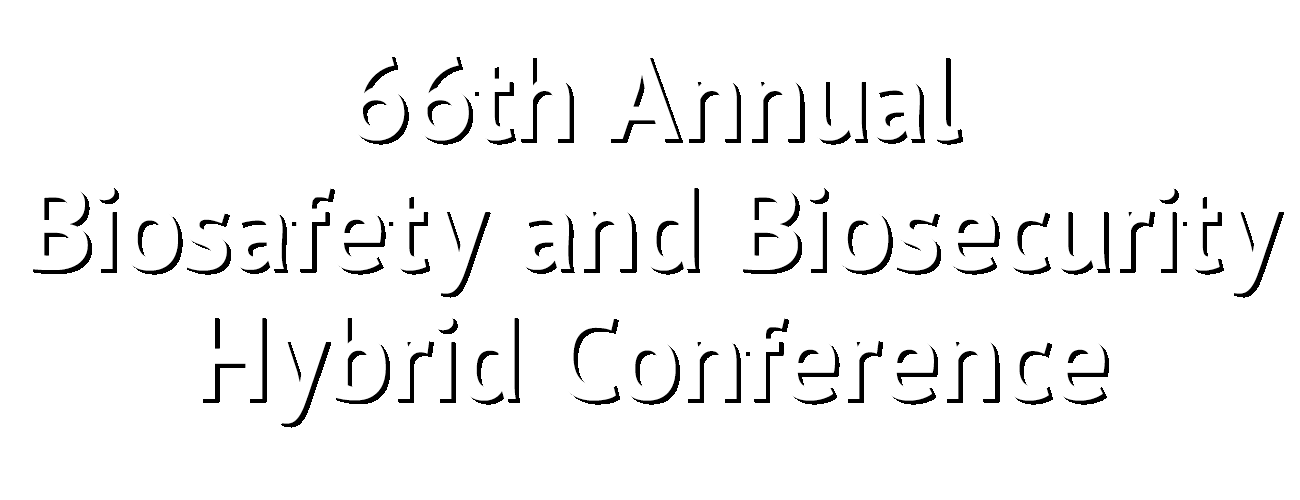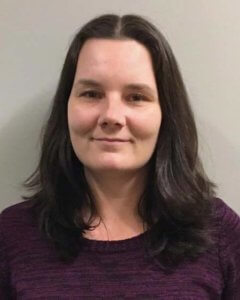Professional Development Courses
All times listed are in CENTRAL TIME ZONE
Intermediate Level Courses
For those with basic knowledge or would like to learn more.
In-Person Courses
October 13-15, 2023
CHI Health Center, Omaha, Nebraska
Saturday, October 14, 2023, 8:00 AM – 5:00 PM, Room 206
4. Facilities Fundamentals for Biosafety Professionals
This course is aimed at strengthening safety at biocontainment facilities by helping biosafety professionals understand how facility operations support overall biocontainment operations. Through a mixture of presentations from experts in the field and interactive exercises, participants will reinforce their knowledge of discrete facility system function and ways individual systems complement each other holistically in operating biocontainment facilities. Participants will gain practical knowledge of related facility issues (e.g., facility design, maintenance, performance verification, and waste management) and their roles in them. The target audience for the course is biosafety professionals who come with backgrounds other than facilities, and it is open to both newcomers and seasoned veterans in biosafety.
Objectives:
- Clarify the practical knowledge gained of facility issues (e.g., design, maintenance, and performance verification) and their roles in them
- Develop an understanding of specific infrastructure, equipment, and systems related to the operation of a biocontainment facility
- Interpret how specific facility systems operate and support biocontainment
Suggested Background: Fundamentals of Biosafety, Risk Assessment, Principles and Practices of Biosafety
Target Audience: All Safety Professionals, All Biosafety Professionals, Facilities Personnel
PDC Level: Intermediate
COURSE FACULTY
CONTACT HOURS
This course has been approved for 1.0 CM points toward RBP/CBSP recertification. ABSA International is approved as a provider of continuing education programs in the clinical laboratory sciences by the ASCLS P.A.C.E.® Program. This course is approved for 7.5 P.A.C.E.® contact hours.
Saturday, October 14, 2023, 8:00 AM – 5:00 PM
5. Facility Commissioning and Recommissioning for BSL-3 Laboratory
By understanding the commissioning and recommissioning processes, it can assist the biosafety professional in start-up or maintaining their laboratory operations to perform the program. Laboratory commissioning, identified in containment guidance documents, is a quality assurance process for the effective functioning of biocontainment laboratories. The biosafety officer and other decision makers benefit by having a basic understanding of the commissioning and recommissioning processes and resulting documentation. This course will review the phases of the new facility commissioning process and similar process for recommissioning. This knowledge base allows the biosafety professional to recognize how commissioning assists in providing and documenting a properly operating facility. A review of the secondary containment features of the BSL-3 laboratory will be disucssed and note specific issues typically observed. There will be a focus on two issues, the reversal of directional airflow and sealing of surfaces and penetrations. Participants will consider methods to identify the issues and present some specific mitigations of these issues; can actively participate in the commissioning/recommissioning processes and understand the methodology, the tools, results, and their interpretation; will know their facility operates correctly, its limitations, and the risk when it does not. This knowledge allows the biosafety professional to check or back check the containment spaces’ performance and use this knowledge to perform daily inspections for maintenance or replacement and control risk to the lowest level. The biosafety professional can identify required features in a new laboratory or review an existing lab with a better understanding of typical issues to assure safe reliable operations.
Objectives:
- Develop an understanding of the overall commissioning and recommissioning processes for containment labs
- Articulate the engineering controls required and effectively participate in the processes
- Identify typical issues observed during commissioning/recommissioning of the laboratory secondary containment barriers and the options for practical solutions to those issues
- Demonstrate a knowledge base and provide documentation to better perform daily inspections to reduce risk for safe and reliable laboratory operations
Suggested Background: None
Target Audience: All Safety Professionals, Laboratory Workers, Operations and Maintenance Personnel
PDC Level: Intermediate
COURSE FACULTY
CONTACT HOURS
This course has been approved for 1.0 CM points toward RBP/CBSP recertification. ABSA International is approved as a provider of continuing education programs in the clinical laboratory sciences by the ASCLS P.A.C.E.® Program. This course is approved for 7.5 P.A.C.E.® contact hours.
Saturday, October 14, 2023, 8:00 AM – 5:00 PM, Room 207
6. Engineering for the Biosafety Professional Part II
Proactive biosafety professionals need to be involved and knowledgeable in the operation, maintenance, and certification of their containment facilities and building systems. Frequently, the biosafety professional is called upon to participate in the planning, design, and validation of a new biocontainment laboratory or renovation of an existing facility. This course provides basic engineering principles that are useful in the planning, design, construction, maintenance, and operation of a BSL-3 or high-containment facility. The principles are expanded to BSL-4 or maximum containment facilities for clarity between BSL-3 and BSL-4 requirements. To participate in these activities, the biosafety professional will need a foundation of engineering fundamentals, skills to ask questions in engineering terms, and the confidence to question the answers. Topics covered include interpreting architectural and engineering drawings including plan views, personnel and waste flows, scaling, calculating air changes, and an in-depth review of HVAC drawings, airflow reversal mitigation, and engineering redundancies. There will be a review of commissioning and certification processes, including elements of ventilation assessment. Individual and group exercises will be conducted for practical application of principles presented. Building on “Engineering for the Biosafety Professional – Part I,” this course will integrate examples that show cause and effect in real-life scenarios.
Objectives:
- Discuss engineering principles
- Apply engineering assessment tools for architectural and engineering drawings
- Evaluate engineering solutions
Suggested Background: Fundamentals of Biosafety, Engineering for the Biosafety Profession Part 1 (preferred)
Target Audience: All Safety Professionals, New Biosafety Professionals
PDC Level: Intermediate
COURSE FACULTY
CONTACT HOURS
This course has been approved for 1.0 CM points toward RBP/CBSP recertification. ABSA International is approved as a provider of continuing education programs in the clinical laboratory sciences by the ASCLS P.A.C.E.® Program. This course is approved for 7.5 P.A.C.E.® contact hours.
Saturday, October 14, 2023, 8:00 AM – 12:00 PM, Room 209
8. Practical Aerobiology Concepts
This course will provide biosafety professionals with an understanding of tools used to generate and sample bioaerosols. Course discussion will cover how bioaerosols are generated, common experimental aerosol generators, and factors that control number of organisms in a single particle. Subsequent material will cover sampling conditions and samplers that are appropriate to collect bioaerosols. The advantages and disadvantages of different bioaerosol generators and samplers will be discussed throughout. Practical application of bioaerosol generators and samplers will be covered both in didactic lecture and small-group activities.
Objectives:
- Describe how bioaerosols are experimentally generated through different aerosol generators
- Identify the factor(s) that control number of organisms contained in a single particle
- Summarize the advantages and disadvantages of different bioaerosol samplers
Suggested Background: Fundamentals of Biosafety, Principles and Practices of Biosafety
Target Audience: All Safety Professionals, New Biosafety Professionals
PDC Level: Intermediate
COURSE FACULTY
CONTACT HOURS
This course has been approved for 0.5 CM points toward RBP/CBSP recertification. ABSA International is approved as a provider of continuing education programs in the clinical laboratory sciences by the ASCLS P.A.C.E.® Program. This course is approved for 3.5 P.A.C.E.® contact hours.
Saturday, October 14, 2023, 8:00 AM – 12:00 PM, Room 205
9. Intersection Between Biosafety and Infection Control: An Introduction to Infection Control and Biosafety in Clinical Spaces
This course is meant for the biosafety professional who would like to learn more about application of biosafety principles in the clinical environment and partnering with Infection Control Departments in health systems. This is increasingly important as clinical trials using biological therapeutics, such as human gene transfer (HGT), require safety professionals to develop investigational product handling, preparation, and administration protocols that align with current clinical safety practices and environments. The goals of this course are to introduce different clinical environments, specific biosafety considerations for each space, hospital regulatory requirements that influence safety protocols, and how to collaborate with hospital infection control professionals to operationalize safety protocols in a way that’s meaningful to hospital staff.
Objectives:
- Describe inpatient, procedural and outpatient clinical environments and how this affects implementation of biosafety practices
- Restate the similarities and differences between biosafety levels, isolation precautions, and standard precautions
- Summarize how NIH and BMBL guidelines relate to hospital regulatory and accreditation requirements when creating protocols for HGT clinical trials
Suggested Background: Principles and Practices of Biosafety
Target Audience: All Safety Professionals, All Biosafety Professionals
PDC Level: Intermediate
COURSE FACULTY
CONTACT HOURS
This course has been approved for 0.5 CM points toward RBP/CBSP recertification. ABSA International is approved as a provider of continuing education programs in the clinical laboratory sciences by the ASCLS P.A.C.E.® Program. This course is approved for 3.5 P.A.C.E.® contact hours.
Saturday, October 14, 2023, 1:00 PM – 5:00 PM NOW A VIRTUAL COURSE: Jan 23, 2024, 11:30-4pm CST
10V. Institutional Biosafety and Biosecurity – Enhancing Oversight through Effective Governance
This course will discuss the importance of ensuring institutions have robust and comprehensive biosafety and biosecurity governance structures in place. Information will be provided about Federal activities related to strengthening biosafety and biosecurity practices and oversight. Participants will discuss and share tools and best practices that institutions can employ to enhance their biosafety and biosecurity programs.Participants will break into small groups to discuss a case study involving a biosafety incident occurring at an institution subject to the NIH Guidelines for Research Involving Recombinant or Synthetic Nucleic Acid Molecules (NIH Guidelines), which illustrates the importance of institutional biosafety oversight and how inadequate local oversight can result in significant problems. Participants should ideally have a working knowledge of the roles and responsibilities of institutions, Institutional Biosafety Committees (IBCs), and Institutional Review Entities (IREs) for biosafety and biosecurity oversight of research subject to the NIH Guidelines and the U.S. Government Policy for Institutional Oversight of Life Sciences Dual Use Research of Concern (DURC).
Objectives:
- Describe how to implement an effective program of biosafety and biosecurity oversight
- Paraphrase common challenges and possible solutions
- Identify tools and best practices that institutions can employ to strengthen their biosafety and biosecurity programs
- Summarize the requirements for reporting incidents under the NIH Guidelines and the importance of ensuring robust and comprehensive biosafety and biosecurity governance structures are in place
Suggested Background: IBC Basics, Background knowledge of the NIH Guidelines for Research Involving Recombinant or Synthetic Nucleic Acid Molecules
Target Audience: All Biosafety Professionals, IBC members, research compliance staff
PDC Level: Intermediate
This webinar will be one 4-hour webinar session on Tuesday, January 23, 2024, 11:30 AM – 4:00 PM CST with a 30-minute break. For the webinar, you should plan on logging in at 11:15 am (CDT) on January 23, 2024. You are required to attend the webinar session, complete the pre-course and post course assessments, and complete the evaluation in order to receive the completion certificate through the ABSA International Training Site. The link in the invitation will be unique to the user and cannot be shared.
CONTACT HOURS
This course has been approved for 0.5 CM points toward RBP/CBSP recertification. ABSA International is approved as a provider of continuing education programs in the clinical laboratory sciences by the ASCLS P.A.C.E.® Program. This course is approved for 3.5 P.A.C.E.® contact hours.
COURSE FACULTY
COURSE FEES
ABSA Members: $440 USD
Nonmembers: $540 USD
To obtain the ABSA member rate, the participant will need to be an ABSA member in the year in which the training is offered. Course fees include: course handouts, access to the ABSA International training site, and 4-hours of interactive instruction from a well-respected subject matter expert.
Confirmed, paid participants will be sent detailed information regarding the course approximately one week prior to the course. Substitutions allowed with notice by 12/26/2023. There is a 15% processing fee for cancellations prior to 12/26/2023. Cancellations between 12/26/2023 and 1/2/2024 will be refunded at 50% of the course fee. No refunds after 1/2/2024.
The links to the various invitations for the course will be unique to the user and cannot be shared. The links are for single, individual use only. If more than one occurrence of an individual’s name is on the attendee list for the webinar through Zoom platform all instances of that person’s name will be removed from the webinar with no refund. The webinar and its associated links are for single, individual use only.
Saturday, October 14, 2023, 1:00 PM – 5:00 PM
11. Respiratory Protection for Biosafety Professionals
This course will provide an overview of respiratory protection personal protection equipment (PPE), including selection considerations for biological and chemical hazards. A deeper dive into key hazards relevant to biosafety professionals and their respiratory protection considerations will follow. While mostly based on U.S. OSHA Respiratory Protection Program requirements, much of theinformation presented will be applicable internationally.
Objectives:
- Describe the basic process for hazard and exposure assessment necessary for selecting appropriate respiratory protection
- Identify the types and styles of respiratory protection equipment, in addition to U.S. OSHA requirements for their use
- Summarize the process of respirator selection and program implementation in their workplace for key hazards
Suggested Background: None
Target Audience: All Biosafety Professionals, All Safety Professionals
PDC Level: Intermediate
COURSE FACULTY
CONTACT HOURS
This course has been approved for 0.5 CM points toward RBP/CBSP recertification. ABSA International is approved as a provider of continuing education programs in the clinical laboratory sciences by the ASCLS P.A.C.E.® Program. This course is approved for 3.5 P.A.C.E.® contact hours.
Sunday, October 15, 2023, 8:00 AM – 5:00 PM, Room 206
13. Pharmaceutical Biosafety Officer Training
The course is intended for Pharma BSOs and can be a complimentary course to Principles and Practices of Biosafety (PPB) offered by ABSA. The instructors will cover key topics such as the Biorisk Management Framework, the ISO 35001 Standard that features a high-level review of the new ISO Standard and implementation examples, and the Regulatory Framework including key regulations in U.S. and non-U.S. regulations and key differences between regions. Examples from Applied Biosafety will lead to a discussion of new technology platforms in the industry to include CRISPR, alpha virus, viral vector gene therapy, human cell lines, lab acquired infections (e.g., N. meningitis, rabies large scale infection, Brucella large-scale), improper inactivation scenarios, animal blood and tissue samples, human neurological tissue concerns, environmental release of biological agents (biological agent release scenario- how handle). This course will be interactive with a variety of group exercises where participants will review P&IDs, identify issues, propose recommendations for what would be acceptable vs. not. Also, look at HVAC, placement of equipment, types of equipment needed, room pressurization, workflow, decontamination (autoclave, HEPA, kill tanks, chemical treatment), permitting, and risk assessment completion. The course will conclude with a roundtable discussion, presentation of the group exercises, and Q&A.
Objectives:
- Identify the global biorisk management regulatory framework applicable to pharmaceutical companies
- Restate how to integrate biosafety principles into engineering design projects
- Summarize how to conduct a biorisk assessment and expectations for biosafety committee approval
Suggested Background: Fundamentals of Biosafety, Risk Assessment, Micro/Molecular Biology 101, Principles and Practices of Biosafety
Target Audience: All Biosafety Professionals
PDC Level: Intermediate
COURSE FACULTY
CONTACT HOURS
This course has been approved for 1.0 CM points toward RBP/CBSP recertification. ABSA International is approved as a provider of continuing education programs in the clinical laboratory sciences by the ASCLS P.A.C.E.® Program. This course is approved for 7.5 P.A.C.E.® contact hours.
Sunday, October 15, 2023, 8:00 AM – 12:00 PM, Room 213
17. Disinfection and Sterilization: Evaluation and Validation Concepts
This course will provide biosafety professionals with an understanding of the quality assurance and evaluation tests used in sterilization and disinfection. Understanding of these tests will directly benefit the selection of quality assurance tests when validating sterilization and disinfection processes and the selection of appropriate disinfectants. Factors responsible for heat resistance of endospores and D values applied to example biological indicators will be discussed. Further material will describe factors that affect disinfectant potency. Disinfectant product labels, disinfectant tests, and neutralizers will be discussed in didactic lecture and applied in small group activities.
Objectives:
- Summarize the factors affecting disinfectant potency
- Restate disinfectant evaluation testing
- Connect technical data with disinfectant product label claims
Suggested Background: Fundamentals of Biosafety, Principles and Practices of Biosafety
Target Audience: All Safety Professionals, Laboratory Workers, New Biosafety Professionals
PDC Level: Intermediate
COURSE FACULTY
CONTACT HOURS
This course has been approved for 0.5 CM points toward RBP/CBSP recertification. ABSA International is approved as a provider of continuing education programs in the clinical laboratory sciences by the ASCLS P.A.C.E.® Program. This course is approved for 3.5 P.A.C.E.® contact hours.
Sunday, October 15, 2023, 1:00 PM – 5:00 PM, Room 213
19. Using the Past to Prevent Future Laboratory-Acquired Infections
Preventing laboratory-acquired infections (LAIs) is a challenge for laboratory managers and biosafety professionals, especially when dealing with an emerging pathogen. It is extremely important to quickly determine if there has been an exposure, what steps need to happen next, including any prophylaxis, root cause analysis, gaps in the biosafety plan, and additional mitigation measures that need to be implemented. This interactive course will demonstrate how real-life scenarios from the ABSA LAI Database can be used as a learning and training tool to help prevent future incidents and LAIs. This course will provide an overview of how to search the LAI database and a review of two published case studies. Participants will be shown how to use an exposure assessment tool and clinical laboratory biological exposure monitoring guide (both provided) to demonstrate that the database scenarios had resulted in an exposure. Participants will be shown how to perform a root cause analysis, apply this information to find the biosafety plan gaps, and determine what additional steps are needed to mitigate the risks. In a group discussion, participants will receive new scenarios from the database; utilize the exposure assessment tool to complete the process that was illustrated from exposure determination to performing the root cause analysis, identifying the gaps, and mitigation steps to help prevent this from happening again. Additionaly, participants will learn how to use published LAI data and these tools to determine how to safely work with an emerging pathogen.
Objectives:
- Describe how the ABSA LAI database can be used for biosafety training and determining how to safely work with emerging pathogens
- Utilize an exposure assessment tool to assess real-life laboratory incidents for potential exposures and to help guide prophylaxis if indicated
- Analyze actual laboratory incidents to determine the root cause and what steps are necessary to mitigate future incidents
Suggested Background: Fundamentals of Biosafety, Risk Assessment, Micro/Molecular Biology 101, Principles and Practices of Biosafety
Target Audience All Safety Professionals, Laboratory Workers
PDC Level: Intermediate
COURSE FACULTY
CONTACT HOURS
This course has been approved for 0.5 CM points toward RBP/CBSP recertification. ABSA International is approved as a provider of continuing education programs in the clinical laboratory sciences by the ASCLS P.A.C.E.® Program. This course is approved for 3.5 P.A.C.E.® contact hours.
Intermediate Virtual Courses
August 29 – November 13
(Although these courses are a part of the 66th Annual Biosafety and Biosecurity Hybrid Conference it is not necessary to attend the conference to register for these webinars.)
Tuesday, September 19 and Thursday, September 21, 2023, 11:30 AM – 4:00 PM CDT
3V. When & Why Does Biosafety Need a Seat at the Plant Research Design Table?
Plant Biosafety is a niche within the biosafety community. How to build and maintain a greenhouse, arthropod and seed processing program can be challenging for biosafety managers because there have not been many courses offered on this topic. This class offers the basics from head house to pathogen/arthropod containment greenhouse design. Plant research is the backbone of both genetically modified, disease resistance, growth enhancement, seed health and breeding of both academic and biotechnology research. Plant biosafety is a niche within biosafety that makes you ask – Do the engineers and project managers understand the need for and when to ask for biosafety input? This course will provide participants with an overview of designing greenhouses from headhouse, seed activities to arthropod containment using the APHIS and ACL containment guidelines. The course will offer a variety of advanced scenarios and interactive exercises that demonstrate the range of biological and other risks routinely encountered in plant research. Participants will be guided through strategies for identifying potential hazards, assessing the magnitude and extent of induced risks and cost, and developing effective control measures to protect the safety of workers, plants, and the environment. The course employs “real world” examples to improve understanding of greenhouse, arthropod and seed operations.
Objectives:
- Restate the established APHIS, ACL containment guidelines, and the established APHIS containment guidelines
- Review and implement guidelines, hazard identification, and risk assessment techniques as they apply to plant, arthropod, and seed research
- Report and communicate biosafety requirements to site engineers and project managers
Suggested Background: None
Target Audience: Experienced Biosafety Professionals, Laboratory Workers, All Safety Professionals, Insectary Personnel
Audience Level: Intermediate
Course Length: 8 hours (two 4-hour live sessions with a 30-minute break each session)
Within 10 business days of purchasing the recording, you will be added to the course on the ABSA International Training Site. If you have already taken ABSA courses, then you will receive an enrollment notification. If you are a new user, you will receive an invitation to create your account on the ABSA International Training Site. Once the account is created, you will see the course on your course dashboard. You will have 60 days to complete the course.
CONTACT HOURS
This course has been approved for 1.0 CM points toward RBP/CBSP recertification. ABSA International is approved as a provider of continuing education programs in the clinical laboratory sciences by the ASCLS P.A.C.E.® Program. This course is approved for 8.0 P.A.C.E.® contact hours.
Registration for this course is now closed. The recording of this webinar is available for purchase until December 19, 2023.
COURSE FACULTY
COURSE FEES
ABSA Members: $690 USD
Nonmembers: $790 USD
To obtain the ABSA member rate, the participant will need to be an ABSA member in the year in which the training is offered. Course fees include: course handouts, access to the ABSA International training site, and 8-hours of interactive instruction from a well-respected subject matter experts.
Monday, October 2 and Thursday, October 5, 2023, 11:30 AM – 4:00 PM CDT
5V. Keeping it Going: Maintaining and Improving a Select Agent Program over the Long Term
Keeping a select agent program going can be difficult, especially in the face of ever-changing regulatory requirements and limited resources. Established procedures may suddenly become unacceptable, interrupting research, and frustrating laboratorians. Likewise, a single unexpected adverse event can put an entire program at risk. Being prepared to deal with such changes and events is critical to maintaining a robust program. Anticipating future challenges can be even more advantageous, elevating a program from good to great. A proactive approach can minimize the impact of new requirements and reduce duration and frequency of crises sparked by sudden, unexpected requirements or events. This course will explore strategies for maintaining and improving an existing program, including how to anticipate and respond to new requirements. The focus will be on U.S. select agent requirements, although a small section on comparable requirements in the international community will be included. Strategies will be based on the instructors’ experience with their program with additional input solicited from class participants during open discussions. Topics will include select agent program history; effective oversight; efficiently meeting ongoing requirements; reporting, responding to, and analyzing incidents; suitability program case studies; inactivation requirements, including “failure” investigation; and inspection preparation and response. The course will consist of topical presentations followed by group discussions aimed at facilitating application of presented strategies to participants’ individual programs and providing a platform to capitalize on participants’ collective experience.
Objectives:
- Identify strategies for efficiently maintaining a select agent or equivalent program in good standing with ongoing requirements, including anticipating areas of emphasis in future inspections and/or future regulatory changes
- Identify strategies for preparing for and responding to regulatory inspections, including strategies to efficiently implement necessary changes.
- Review a series of suitability program case studies and identify strategies for dealing with potential suitability concerns in accompanying exercises
- Summarize inactivation requirements and identify successful strategies for compliance
Suggested Background: None
Target Audience: All Safety Professionals, Select Agent Program Safety Professionals
Audience Level: Intermediate
Course Length: 8 hours (two 4-hour live sessions with a 30-minute break each session)
Within 10 business days of purchasing the recording, you will be added to the course on the ABSA International Training Site. If you have already taken ABSA courses, then you will receive an enrollment notification. If you are a new user, you will receive an invitation to create your account on the ABSA International Training Site. Once the account is created, you will see the course on your course dashboard. You will have 60 days to complete the course.
CONTACT HOURS
This course has been approved for 1.0 CM points toward RBP/CBSP recertification. ABSA International is approved as a provider of continuing education programs in the clinical laboratory sciences by the ASCLS P.A.C.E.® Program. This course is approved for 8.0 P.A.C.E.® contact hours.
Registration for this course is now closed. The recording of this webinar is available for purchase until January 2, 2024.
COURSE FACULTY
COURSE FEES
ABSA Members: $690 USD
Nonmembers: $790 USD
To obtain the ABSA member rate, the participant will need to be an ABSA member in the year in which the training is offered. Course fees include: course handouts, access to the ABSA International training site, and 8-hours of interactive instruction from a well-respected subject matter experts.
Monday, November 13 and Wednesday, November 15, 2023, 10:00 AM – 2:30 PM CST
7V. Laboratory Facility Programming and Design Best Practices
This course will offer guidance of key principles underlying the programming and design of research and diagnostics laboratories. It is intended for architects, designers, and biosafety professionals desiring an increased awareness of the complexity and challenges associated with designing a laboratory. Participants will be introduced to the laboratory design process as it relates to programming and pre-design, building zoning, operational efficiency, biosafety and biosecurity considerations, and flexible/expandable strategies. Participants will participate in guided discussions, develop diagrams to illustrate best practice concepts, and analyze existing plans with respect to the design principles under discussion.
Objectives:
- Summarize the critical information that must be gathered prior to the development of a laboratory facility design
- Describe how to assemble and synthesize pre-design information appropriate to the development of a laboratory facility
- Paraphrase the principles of good laboratory design, and methods for developing, analyzing, and improving them
Suggested Background: Fundamentals of Biosafety
Target Audience: All Safety Professionals, Laboratory Workers, Managers of design projects
Audience Level: Intermediate
Course Length: 8 hours (two 4-hour live sessions with a 30-minute break each session)
Within 10 business days of purchasing the recording, you will be added to the course on the ABSA International Training Site. If you have already taken ABSA courses, then you will receive an enrollment notification. If you are a new user, you will receive an invitation to create your account on the ABSA International Training Site. Once the account is created, you will see the course on your course dashboard. You will have 60 days to complete the course.
CONTACT HOURS
This course has been approved for 1.0 CM points toward RBP/CBSP recertification. ABSA International is approved as a provider of continuing education programs in the clinical laboratory sciences by the ASCLS P.A.C.E.® Program. This course is approved for 8.0 P.A.C.E.® contact hours.
Registration for this course is now closed. The recording of this webinar is available for purchase until February 13, 2024.
COURSE FACULTY
COURSE FEES
ABSA Members: $690 USD
Nonmembers: $790 USD
To obtain the ABSA member rate, the participant will need to be an ABSA member in the year in which the training is offered. Course fees include: course handouts, access to the ABSA International training site, and 8-hours of interactive instruction from a well-respected subject matter experts.































